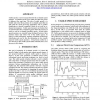Free Online Productivity Tools
i2Speak
i2Symbol
i2OCR
iTex2Img
iWeb2Print
iWeb2Shot
i2Type
iPdf2Split
iPdf2Merge
i2Bopomofo
i2Arabic
i2Style
i2Image
i2PDF
iLatex2Rtf
Sci2ools
105
Voted
ISCAS
2003
IEEE
2003
IEEE
Usable speech measures and their fusion
Usable speech is a novel concept related to the co-channel speech problem. Co-channel speech occurs when more than one person is talking at the same time. The idea of usable speech is to identify and extract those portions of co-channel speech that are still useful for speech processing applications such as speaker identification or speech recognition, which do not work in cochannel environments. Usable speech measures are features that are extracted from the co-channel signal to detect the presence of usable as well as co-channel (unusable) speech. Several usable speech measures are currently being developed; however, these measures detect only about 75% of the usable speech. To improve on this performance, nonlinear estimation and Bayesian classification are used to fuse the information in two recently proposed usable speech measures. Using fusion resulted in a 15% increase in hits (usable speech frames detected) and a 37% decrease in false alarms.
Related Content
| Added | 04 Jul 2010 |
| Updated | 04 Jul 2010 |
| Type | Conference |
| Year | 2003 |
| Where | ISCAS |
| Authors | Robert E. Yantorno, Brett Y. Smolenski |
Comments (0)

